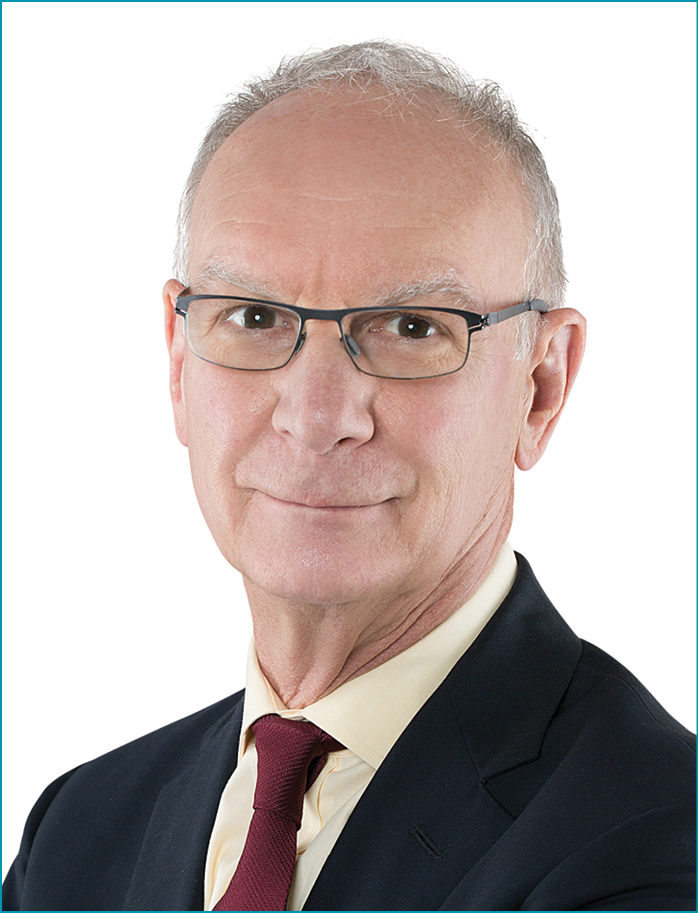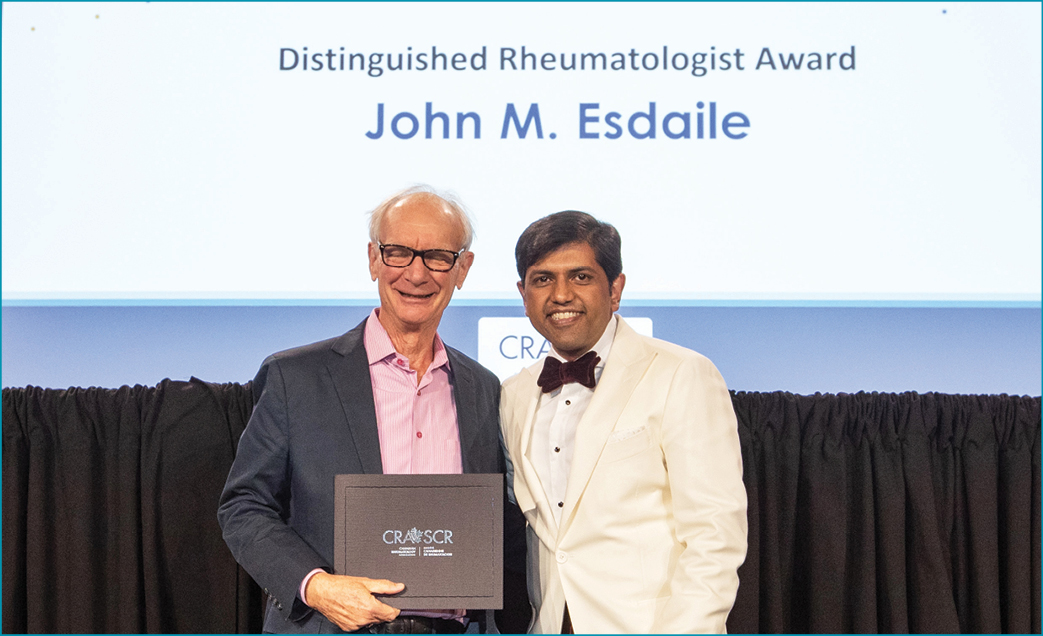Fall 2024 (Volume 34, Number 3)
The CRA’s 2024 Distinguished Rheumatologist:
Dr. John Esdaile
Download PDF

Why did you become a rheumatologist? What or who influenced you along the way to do so? How did your time working at McGill and at Yale mold your career?
I was fortunate to have a great education that permitted me to be admitted to McGill Medical School from high school. Early on in medical school I was mentored by the premier immunology group at the time — Samuel O. Freedman, Phil Gold, Joe Shuster and David Hawkins. All were research leaders (one was nominated for a Nobel Prize) and outstanding clinicians. The Immunology Division was expanded to include rheumatology. Based on the cases I found most interesting as a trainee they felt I would enjoy that aspect of the field.
At Yale University I was involved with the Robert Wood Johnson Clinical Scholars Program run by the grandfather of clinical epidemiology,
Dr. Alvan R. Feinstein. In my second year at Yale, Alvan appointed me to the faculty while I obtained a Masters of Public Health degree and continued to work with him. I was honoured to be allowed to give some of Alvan’s lectures. He turned me into a clinical epidemiologist.
Dedicated to expanding Canada’s role in patient-focused arthritis research, you have been involved in establishing Arthritis Research Canada/Arthrite-recherche Canada and were named the founding Scientific Director.
You have prioritized investing in people and created a culture dedicated to supervising trainees and mentoring young scientists in a wide variety of disciplines. Over twenty-three years, the organization has grown to more than 100 scientists and staff, located at seven universities across Canada: University of British Columbia (UBC), Simon Fraser, Calgary, McGill, Laval, Dalhousie and the University of Montreal.
What motivated you to establish Arthritis Research Canada/Arthrite-recherche Canada?
I had informed the search committee looking for a new Division Head at UBC that I intended to establish a research centre. The Dean at the time noted that neither the Medical School nor the University as a whole had a major interest in rheumatology research and that I should proceed independently. Fortunately, a pioneering group (Don Elkington, John Hurst, Jack Kowarsky [chair], Peter-Paul Saunders) volunteered to form a Board of Directors of Arthritis Research Canada/Arthrite-recherche Canada and bring on new members. Over the years the board has included giants from the fields of manufacturing, marketing, finance, law, accounting, and provincial and national politics, including Colin Hansen and Joy McPhail provincially, and two senators, Pat Carney and Nancy Greene Raine. The first chair, Jack Kowarsky, asked that a national perspective be taken from the start.
I was able to raise money for the first ever Chair in Biostatistics related to arthritis and musculoskeletal disease. There were major contributions from philanthropists Maureen and Milan Ilich, Merck Frosst Canada, the Lohn Foundation and from Simon Fraser University itself (Michael Stevenson, President). With the chair at Simon Fraser there were suddenly two Centres. The third and fourth centres followed; with the support of the McCaig family, the University of Calgary; and l’Université Laval.
The new Scientific Director, Dr. Diane Lacaille, has been responsible for bringing in the most recent new centres at McGill University, Dalhousie University and l’Université de Montréal.
Arthritis Research Canada/Arthrite-recherche Canada benefits from huge expertise in many different domains related to arthritis research in different centres across the country. This has supported a national collaborative research approach and an incredible training program for what is now more than three dozen graduate students at all levels through post-doctoral.
What is the greatest professional and organizational challenge you have faced, and how did you address/overcome this challenge?
There really has only been one major challenge. A national arthritis organization tried to arrest the development of Arthritis Research Canada/Arthrite-recherche Canada. Fortunately, this was averted thanks to the legal involvement of a board member and their colleagues. Like many challenges in life, if you survive the challenge, you turn out to be stronger and wiser going forward.
You have authored more than 280 publications in refereed journals. Your major areas of research interest include systemic lupus erythematosus, rheumatoid arthritis and osteoarthritis. Your focus has been on early diagnosis and early intervention as key elements to reduce disability and to save lives. Can you tell us more about your research and its implications?
As what would now be called a PGY2, my colleagues were aghast that I was interested in arthritis. They felt that there was next to nothing that could be done for patients with arthritic diseases and that I ran the risk of wasting my life. It seemed to me that the huge knowledge gaps that existed were fertile ground for research. Indeed, as you suggest, early diagnosis, more accurate diagnosis, and early aggressive intervention, particularly for the many types of inflammatory arthritis, have been a major goal of my research.
It is important to note that my research has been supported by an ever-increasing number of younger bright hardworking scientists. I do believe that only research is going to improve the lives of people with arthritis. The future will be different and the scientists of Arthritis Research Canada/Arthrite-recherche Canada are now including preventing arthritis in their research palette, something that was hard to imagine 45 years ago.
What do you foresee as challenges to Canadian rheumatologists in the future and what can individual rheumatologists and the CRA do to meet these challenges?
The Canadian Rheumatology Association has been hugely successful. All of the universities where we have centres have outstanding clinicians who are active in supporting and guiding the activities of the Canadian Rheumatology Association. I believe it was Niels Bohr who said “prediction is very difficult, especially if it is about the future!” I could not have predicted the growth of Arthritis Research Canada/Arthrite-recherche Canada in 1999, and I hesitate to predict the future challenges for the Canadian Rheumatology Association. I am sure it will meet and deal successfully with the inevitable challenges as they arise.
You are the recipient of numerous awards and accolades including being named the Kirkland Scholar by the Kirkland Foundation in New York, NY. In 2007, you were elected a Fellow of the Canadian Academy of Health Sciences and, in 2012, you received the American College of Rheumatology Masters award. What is your proudest accomplishment to date?
Undoubtedly the creation of Arthritis Research Canada/Arthrite-recherche Canada, and being able to encourage outstanding trainees to commit to a life as researchers and supporting faculty as they start their careers. I think everyone that I have personally hired is smarter than I am and that has worked out very well for me as they give me undue credit.
What do you believe are the qualities of a distinguished rheumatologist?
One could come up with an extensive list. If there was a single one, I would suggest always trying to put the patient first. In the current healthcare system, one does not always get the feeling that the patient is indeed the most important aspect of the system, but I do believe that rheumatologists and those interested in musculoskeletal disease stand out as a group who believe this. It should apply to the clinical and the research world.
In your acceptance video for this award, you jokingly referred to it as the Extinguished Rheumatologist Award. You are well known for your facility with words and wordplay. How did you hone this talent?
My parents encouraged public speaking from an early age, and in high school I was very involved in debating. Words and word play can make ideas interesting. Also, entertaining an audience helps people stay awake.
What are some of your other passions outside of rheumatology and medical education?
I am incredibly proud of James, William and Tara, my children, and their ability to develop into extremely successful individuals with different interests. They are doing a sterling job of improving the world. I have three grandchildren who are simply adorable. Now that I am retired, I can do all sorts of things that I never had time to do, like cooking, reading non-medical books, playing tennis, and bicycling. My wife, Jane Bern, tolerates all of my bad habits — well almost all. I am passionate about her.
You are marooned on a desert island? What book would you like to have on hand with you?
A book on boat building.
What is your favourite food or cuisine?
I don’t know that I have a favourite. A perfectly cooked dish is all that I ask for!
You are handed a plane ticket to anywhere in the world. Where do you go?
I might turn in the plane ticket in exchange for a caravan and drive around to some places in North America that I have never visited.
How many cups of coffee does it take to make a productive day?
It depends on how you define a cup of coffee. One shot of espresso is 50-70 mg of caffeine, and one cup of filtered coffee is at least 200 mg. I simply cannot function in the morning without a latte with at least two shots of espresso. I used to drink more, but I am totally unwilling to give up my morning primer of espresso.

Dr. John Esdaile receiving his award from outgoing
CRA President
Dr. Nigil Haroon at the CRA Annual
Scientific Meeting in Winnipeg, which took place in
February 2024.
John M. Esdaile, MD, MPH, FRCPC, FCAHS, MACR
Professor of Medicine Emeritus,
University of British Columbia
Scientific Director Emeritus,
Arthritis Research Canada/Arthrite-recherche Canada
|
